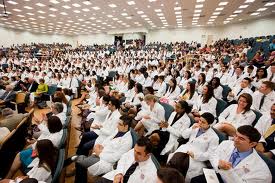News reports in the New York Times suggest that the days for Americans studying in Caribbean Medical Schools may be coming to an end.
News reports suggest that 16 medical schools are “attacking” Caribbean medical schools in what has been described as a turf war to keep Americans in American medical schools rather than have them go to medical school in the Caribbean region.
Barbados, St. Kitts, Grenada and many islands attract New York based students to their shores. The promise by American Schools is that the students will get critically important training in American hospitals in New York State.
Many Caribbean Medical Schools encourage American students to apply not only to give them a different experience at a level equal to theirs (academically) but also to make valuable foreign exchange. There is now an “aggressive campaign to persuade The State Board of Regents to make it harder, almost impossible for the students to use NY hospitals for training if they attend Caribbean schools”, one writer said in the NY Times.
“The changes, if approved, could put at least some of the Caribbean schools in jeopardy, their deans said, because their small islands lack the hospitals to provide the hands-on training that a doctor needs to be licensed in the United States.”, said one reporter. However, most Caribbean Medical Schools do offer internships at local teaching hospitals or clinical trials overseas said an anonymous source.
“This is ridiculous and is just the USA being the USA. The academic level of schooling is just as superior, if not more so than that of the US. It is untenable that over 40 000 students would be virtually forced to study in New York because the US does not want them to attend Caribbean Schools. About one quarter of the students in residency in the US went to Caribbean Medical schools”, said one physician. “It should be there choice”.
However, there is a shortage of doctors in the US and this is likely an attempt to keep students within their shores. According to the report, “With experts predicting a shortage of 90,000 doctors in the United States by 2020, the defenders of these schools say that they fill a need because their graduates are more likely than their American-trained peers to go into primary and family care, rather than into higher-paying specialties like surgery.”
New York wishes to fill tis shortage of doctors and encourage them to go beyond family practice and also into surgery and other specialty areas.
“The New York medical school deans say that they want to expand their own enrollment to fill the looming shortage, but that their ability to do so is impeded by competition with the Caribbean schools for clinical training slots in New York hospitals. Their argument is one that has been lobbed at Caribbean schools for decades: that those schools turn out poorly trained students who undercut the quality of training for their New York peers learning alongside them at the same hospitals.” The report continued.
“That is a ridiculous claim. Students at the Caribbean universities have to study the same curriculum generally and do the same rotations and internships at the highest quality. A doctor must satisfy certain criteria before he or she can practice anywhere in the world”, said the physician who did not wish to be named.
BRIBERY
New York deans of medical schools are also adamant that the medical schools in the Caribbean are just money-making institutions “ bribing New York hospitals by paying them millions of dollars to take their students. The American medical schools traditionally pay nothing, because hospitals like the prestige of being associated with universities”, the New York Times report continued.
“These are designed to be for-profit education mills to train students to pass the boards, which is all they need to get a license,” said Dr. Michael J. Reichgott, a professor at the Albert Einstein College of Medicine in the Bronx.
Charles Modica, chancellor of St George’s University in Grenada’s first class, started studying in 1977, making it one of the oldest in the Caribbean, said the New York deans were simply afraid of competition.
“It’s basically a situation where the New York State deans just can’t hold their noses high enough up in the air, and I think it’s disgraceful,” said Mr. Modica, who founded St. George’s after he was rejected from medical school and went on to law school. Most Americans were unaware of the school’s existence until the Reagan administration invaded Grenada in 1983 and rescued stranded students there amidst political unrest.
The dispute is now at a delicate stage. Officials at Ross University in Dominica said, “If the domestic schools felt we were taking opportunities away from their students, if they can specifically tell us what location we were taking them away from — that question was never answered,” said Dr. Nancy Perri, Ross’s chief academic officer.
The New York schools want the state to adopt the position of the American Medical Association which says the “core clinical curriculum of a foreign medical school should be provided by that school and that U.S. hospitals should not provide substitute core clinical experience.”
“The foreign schools do not go through the same accreditation process as the United States schools. So the state has its own process for approving foreign schools, but the New York schools contend it is not as thorough as the national accreditation process, and it should be” the New York Times report continued.














